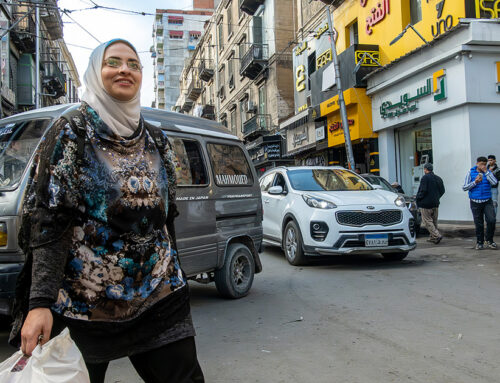Thought Leadership: A Hybrid Future
In his role at Haggai International, Dr. Tyler Lenocker is tasked with developing initiatives that position Haggai International as a thought leader in global missions for decades to come.
Virtual or in-person? Since COVID-19, this question has dominated our churches, our businesses, our schools, and sometimes even our families. Whichever option we choose, we must recognize that digital technology has transformed our lives and relationships, as all technologies have throughout history: TV, cars, telephones, books, written language, and more. Experts have labeled our own time the “4th Industrial Revolution.” Between 2015 and 2025, the amount of information (data) gathered digitally will have increased by more than 15-fold. The data expansion drives technological changes that already shape our lives. Most people in the world experience the tech revolution through their smart phones. A 2019 study showed that Thailand had 92 million phone subscriptions — in a country of only 70 million people! Throughout the world, these devices are reshaping human community, linking people with new global or regional networks, but also weakening and changing local relationships. Technology is not simply a tool; it is something that shapes and impacts society and culture. It changes who we relate to and how we relate to them. At Haggai, we are seeking to better understand how these generational changes are shaping Gospel witness around the world.
Young people will lead the way in our understanding of and critical engagement with emerging technology. Studies show that youth in Gen Z are more conflicted about the benefits of technology and show higher preference for in-person learning compared with the more tech-positive Millennial generation. Gen Z’s perspective follows what many experts argue: thoughtful digital (or virtual) engagement to enhance our (and others’) in-person lives rather than either uncritical embrace or total rejection of emerging technologies. Haggai seeks to balance the benefits of virtual and in-person methods in our equipping, all while prioritizing Gospel engagement in local contexts. Our mixed equipping methods at the international level, and then a wide variety of formats promoted through our national ministries, frees us to flexibly engage a changing world.
Not all regions will experience our tech revolution in the same way. Research demonstrates that global technological disparities will likely grow in the future rather than decline. The adoption of the 5G network around the world (which will facilitate greater utilization of data to speed economic development) varies widely. Wealthy regions (East Asia, North America, and Europe) will see 5G adoption rates between 35% and 50% by 2025, whereas in Latin America, Africa, and the Middle East, 5G adoption will range between 3% and 7%. Data collection — which will drive and direct innovation — is centered in a few big tech companies, almost all based in the U.S.
Technology is not simply a tool; it is something that shapes and impacts society and culture. It changes who we relate to and how we relate to them. At Haggai, we are seeking to better understand how these generational changes are shaping Gospel witness around the world.
Our organization has always prioritized contextually relevant methods for equipping Gospel leaders. This priority guides our engagement with technology and its diverse impact around the world. Starting at the end of this year and moving into next, Haggai will launch research initiatives to better grasp how our leaders are engaging with emerging technologies, both in how they equip other Christian leaders and how they reach their communities and countries with the Gospel.
The Body of Christ is called to be where people are. Gospel transformation begins with presence, whether in the Amazon Rainforest or the deepest recesses of online social networks. So, virtual or in person? The simple answer is that the future is hybrid, but we have much to learn in how to be faithful and transformative witnesses to the Gospel in a rapidly changing world.
Written by Vice President of Global Research Dr. Tyler Lenocker
Sources:
Jeff Desjardins. Signals: The 27 Trends Defining the Future of the Global Economy. Hoboken, NJ: Wiley, 2022.
Jonas Kurlberg and Peter M. Phillips. Missio Dei in a Digital Age. London: SCM Press, 2020.
Corey Seemiller and Meghan Grace. Generation Z: A Century in the Making. London: Routledge, 2019.
This article was written for the Winter 2023 edition of Impact magazine. To read or download it, click here.
Thought Leadership: A Hybrid Future
In his role at Haggai International, Dr. Tyler Lenocker is tasked with developing initiatives that position Haggai International as a thought leader in global missions for decades to come.
Virtual or in-person? Since COVID-19, this question has dominated our churches, our businesses, our schools, and sometimes even our families. Whichever option we choose, we must recognize that digital technology has transformed our lives and relationships, as all technologies have throughout history: TV, cars, telephones, books, written language, and more. Experts have labeled our own time the “4th Industrial Revolution.” Between 2015 and 2025, the amount of information (data) gathered digitally will have increased by more than 15-fold. The data expansion drives technological changes that already shape our lives. Most people in the world experience the tech revolution through their smart phones. A 2019 study showed that Thailand had 92 million phone subscriptions — in a country of only 70 million people! Throughout the world, these devices are reshaping human community, linking people with new global or regional networks, but also weakening and changing local relationships. Technology is not simply a tool; it is something that shapes and impacts society and culture. It changes who we relate to and how we relate to them. At Haggai, we are seeking to better understand how these generational changes are shaping Gospel witness around the world.
Young people will lead the way in our understanding of and critical engagement with emerging technology. Studies show that youth in Gen Z are more conflicted about the benefits of technology and show higher preference for in-person learning compared with the more tech-positive Millennial generation. Gen Z’s perspective follows what many experts argue: thoughtful digital (or virtual) engagement to enhance our (and others’) in-person lives rather than either uncritical embrace or total rejection of emerging technologies. Haggai seeks to balance the benefits of virtual and in-person methods in our equipping, all while prioritizing Gospel engagement in local contexts. Our mixed equipping methods at the international level, and then a wide variety of formats promoted through our national ministries, frees us to flexibly engage a changing world.
Not all regions will experience our tech revolution in the same way. Research demonstrates that global technological disparities will likely grow in the future rather than decline. The adoption of the 5G network around the world (which will facilitate greater utilization of data to speed economic development) varies widely. Wealthy regions (East Asia, North America, and Europe) will see 5G adoption rates between 35% and 50% by 2025, whereas in Latin America, Africa, and the Middle East, 5G adoption will range between 3% and 7%. Data collection — which will drive and direct innovation — is centered in a few big tech companies, almost all based in the U.S.
Technology is not simply a tool; it is something that shapes and impacts society and culture. It changes who we relate to and how we relate to them. At Haggai, we are seeking to better understand how these generational changes are shaping Gospel witness around the world.
Our organization has always prioritized contextually relevant methods for equipping Gospel leaders. This priority guides our engagement with technology and its diverse impact around the world. Starting at the end of this year and moving into next, Haggai will launch research initiatives to better grasp how our leaders are engaging with emerging technologies, both in how they equip other Christian leaders and how they reach their communities and countries with the Gospel.
The Body of Christ is called to be where people are. Gospel transformation begins with presence, whether in the Amazon Rainforest or the deepest recesses of online social networks. So, virtual or in person? The simple answer is that the future is hybrid, but we have much to learn in how to be faithful and transformative witnesses to the Gospel in a rapidly changing world.
Written by Vice President of Global Research Dr. Tyler Lenocker
Sources:
Jeff Desjardins. Signals: The 27 Trends Defining the Future of the Global Economy. Hoboken, NJ: Wiley, 2022.
Jonas Kurlberg and Peter M. Phillips. Missio Dei in a Digital Age. London: SCM Press, 2020.
Corey Seemiller and Meghan Grace. Generation Z: A Century in the Making. London: Routledge, 2019.
This article was written for the Winter 2023 edition of Impact magazine. To read or download it, click here.
Thought Leadership: A Hybrid Future
In his role at Haggai International, Dr. Tyler Lenocker is tasked with developing initiatives that position Haggai International as a thought leader in global missions for decades to come.
Virtual or in-person? Since COVID-19, this question has dominated our churches, our businesses, our schools, and sometimes even our families. Whichever option we choose, we must recognize that digital technology has transformed our lives and relationships, as all technologies have throughout history: TV, cars, telephones, books, written language, and more. Experts have labeled our own time the “4th Industrial Revolution.” Between 2015 and 2025, the amount of information (data) gathered digitally will have increased by more than 15-fold. The data expansion drives technological changes that already shape our lives. Most people in the world experience the tech revolution through their smart phones. A 2019 study showed that Thailand had 92 million phone subscriptions — in a country of only 70 million people! Throughout the world, these devices are reshaping human community, linking people with new global or regional networks, but also weakening and changing local relationships. Technology is not simply a tool; it is something that shapes and impacts society and culture. It changes who we relate to and how we relate to them. At Haggai, we are seeking to better understand how these generational changes are shaping Gospel witness around the world.
Young people will lead the way in our understanding of and critical engagement with emerging technology. Studies show that youth in Gen Z are more conflicted about the benefits of technology and show higher preference for in-person learning compared with the more tech-positive Millennial generation. Gen Z’s perspective follows what many experts argue: thoughtful digital (or virtual) engagement to enhance our (and others’) in-person lives rather than either uncritical embrace or total rejection of emerging technologies. Haggai seeks to balance the benefits of virtual and in-person methods in our equipping, all while prioritizing Gospel engagement in local contexts. Our mixed equipping methods at the international level, and then a wide variety of formats promoted through our national ministries, frees us to flexibly engage a changing world.
Not all regions will experience our tech revolution in the same way. Research demonstrates that global technological disparities will likely grow in the future rather than decline. The adoption of the 5G network around the world (which will facilitate greater utilization of data to speed economic development) varies widely. Wealthy regions (East Asia, North America, and Europe) will see 5G adoption rates between 35% and 50% by 2025, whereas in Latin America, Africa, and the Middle East, 5G adoption will range between 3% and 7%. Data collection — which will drive and direct innovation — is centered in a few big tech companies, almost all based in the U.S.
Technology is not simply a tool; it is something that shapes and impacts society and culture. It changes who we relate to and how we relate to them. At Haggai, we are seeking to better understand how these generational changes are shaping Gospel witness around the world.
Our organization has always prioritized contextually relevant methods for equipping Gospel leaders. This priority guides our engagement with technology and its diverse impact around the world. Starting at the end of this year and moving into next, Haggai will launch research initiatives to better grasp how our leaders are engaging with emerging technologies, both in how they equip other Christian leaders and how they reach their communities and countries with the Gospel.
The Body of Christ is called to be where people are. Gospel transformation begins with presence, whether in the Amazon Rainforest or the deepest recesses of online social networks. So, virtual or in person? The simple answer is that the future is hybrid, but we have much to learn in how to be faithful and transformative witnesses to the Gospel in a rapidly changing world.
Written by Vice President of Global Research Dr. Tyler Lenocker
Sources:
Jeff Desjardins. Signals: The 27 Trends Defining the Future of the Global Economy. Hoboken, NJ: Wiley, 2022.
Jonas Kurlberg and Peter M. Phillips. Missio Dei in a Digital Age. London: SCM Press, 2020.
Corey Seemiller and Meghan Grace. Generation Z: A Century in the Making. London: Routledge, 2019.
This article was written for the Winter 2023 edition of Impact magazine. To read or download it, click here.















